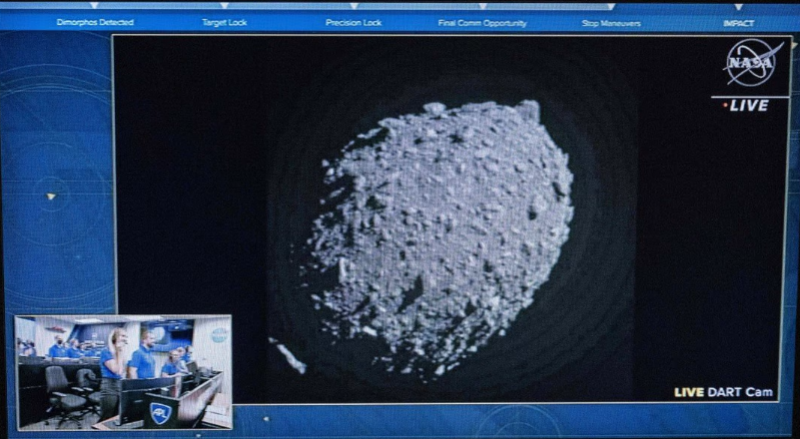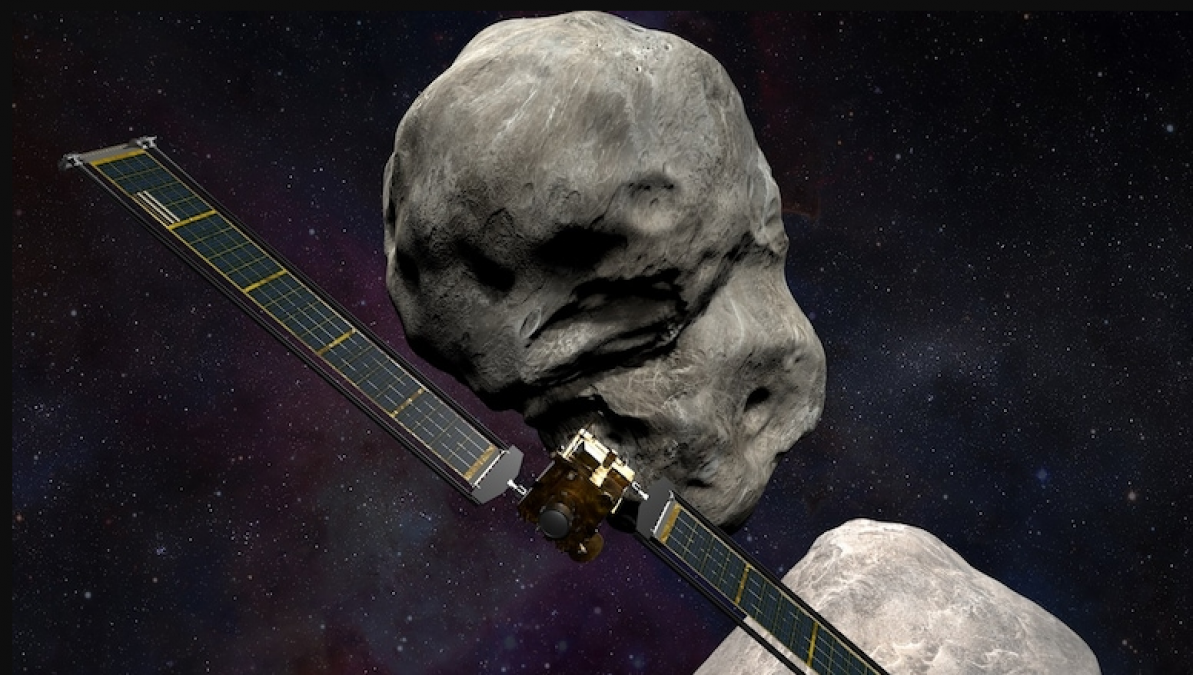
Florida: In an unprecedented dress rehearsal for the day a deadly rock threatens Earth, a Nasa spacecraft slammed into an asteroid at breakneck speed on Monday.
The spacecraft named Dart crashed into a harmless asteroid 9.6 million kilometres (7 million miles) away during the galactic grand slam, travelling at 22,500 kilometres per hour (14,000mph).
Scientists anticipated that the collision would alter the asteroid's orbit, create a crater, and send streams of rocks and dirt into space.
"We are influential!" Elena Adams made an announcement while jumping around and raising her arms in the air.
Zhengdong Cheng Nasa's researcher has pleaded guilty in a case involving China ties

In order to see the spectacle, telescopes on Earth and in space pointed at the same spot in the sky. Even though Dart's radio signal abruptly stopped, the impact was immediately apparent. However, it will take days or even weeks to determine how much the asteroid's path was altered.
The US$325 million mission represented the first attempt to move any natural object in space, be it an asteroid or otherwise.
At a news conference afterward, Adams declared, "As far as we can tell, our first planetary defence test was a success." The audience cheered. "I believe that humans should get more rest. Without a doubt, I will Bill Nelson, the administrator of NASA, reminded people via Twitter earlier in the day that "No, this is not a movie plot." We've all seen it in movies like Armageddon, but the stakes in real life are high, he continued in a prerecorded video.
IMPACT SUCCESS! Watch from #DARTMIssion’s DRACO Camera, as the vending machine-sized spacecraft successfully collides with asteroid Dimorphos, which is the size of a football stadium and poses no threat to Earth. pic.twitter.com/7bXipPkjWD
— NASA (@NASA) September 26, 2022
The target for Monday is Dimorphos, a 160-meter (525-foot) asteroid. It is actually a moonlet of Didymos, which is Greek for "twin," a rapidly spinning asteroid five times larger than the junior partner that ejected material to form it.
They are the perfect candidates for the test to save the world because they have been orbiting the sun for aeons without endangering Earth.
Launched in November of last year, the Double Asteroid Redirection Test (DART) spacecraft, which is the size of a vending machine, used cutting-edge navigational technology created by the mission manager and spacecraft builder, Johns Hopkins University's Applied Physics Laboratory.
Only an hour before impact, Dart's on-board camera, a crucial component of this clever navigation system, spotted Dimorphos.
Adams and other ground controllers in Laurel, Maryland watched with growing excitement as Dimorphos loomed larger and larger in the field of view alongside its bigger companion with an image beaming back to Earth every second.
Dimorphos appeared in the photographs minutes later all by itself; it resembled a massive grey lemon with boulders and rubble on the surface. As the radio transmission came to an end, the final image on the screen froze.
Flight controllers cheered, hugged, and gave high fives to one another. After completing their mission, the Dart team immediately started celebrating. There wasn't much grief over the spacecraft's destruction.
"Normally, losing a spacecraft's signal is very bad. However, in this instance, it was the desired result, according to NASA programme scientist Tom Statler.
Scientist Carolyn Ernst from Johns Hopkins University said the spacecraft was unquestionably "kaput," with remnants possibly in the new crater or ejecting into space with the asteroid's material.
US pledges closer defence ties with India on the same day that latter expresses distress over F-16 deal with Pakistan
Scientists insisted that Dimorphos would not be broken by Dart. Compared to the asteroid's 5 billion kg, the spacecraft only carried a meagre 570kg (1,260 pounds) (11 billion pounds). However, that ought to be sufficient to shorten its 11-hour, 55-minute orbit of Didymos.
The impact should reduce that time by ten minutes, but it will take several days to almost a month for telescopes to confirm the new orbit. Scientists pointed out that although the predicted orbital shift of 1% might not seem significant. However, they emphasised that over time, it would amount to a significant change.
NASA's Lori Glaze, director of the division of planetary science, declared, "Now is when the science starts. "We'll be able to actually see how successful we were now."
Given enough time, planetary defence experts prefer nudging a potentially dangerous asteroid or comet out of the way rather than blowing it up and creating numerous pieces that could fall on Earth.
For large space rocks, multiple impactors might be required, or perhaps a combination of impactors and hypothetical "gravity tractors," which would use their own gravity to pull an asteroid into a safer orbit.
US issues dire warnings about the use of nuclear weapons by Russia in Ukraine
When referring to the mass extinction that occurred 66 million years ago and is thought to have been brought on by a significant asteroid impact, volcanic eruptions, or both, NASA's senior climate adviser Katherine Calvin said, "The dinosaurs didn't have a space programme to help them know what was coming, but we do.
Since its founding by astronauts and physicists 20 years ago, the non-profit B612 Foundation has pushed for impact tests like Dart to safeguard Earth from asteroids.
Despite Monday's accomplishment, the executive director of the foundation and a former astronaut Ed Lu cautioned that more needs to be done to identify the numerous space rocks that are still out there.
According to NASA, significantly less than half of the estimated 25,000 near-Earth objects in the lethal 140 metre range have been found. Less than 1% of the millions of smaller asteroids that have the potential to cause widespread damage are also known.
According to Lu, the National Science Foundation and US Energy Department's Vera Rubin Observatory, which is being built in Chile, will revolutionise the asteroid discovery process.
The goal in this situation is still to find and track asteroids. To protect the Earth, that is what needs to happen, he declared.